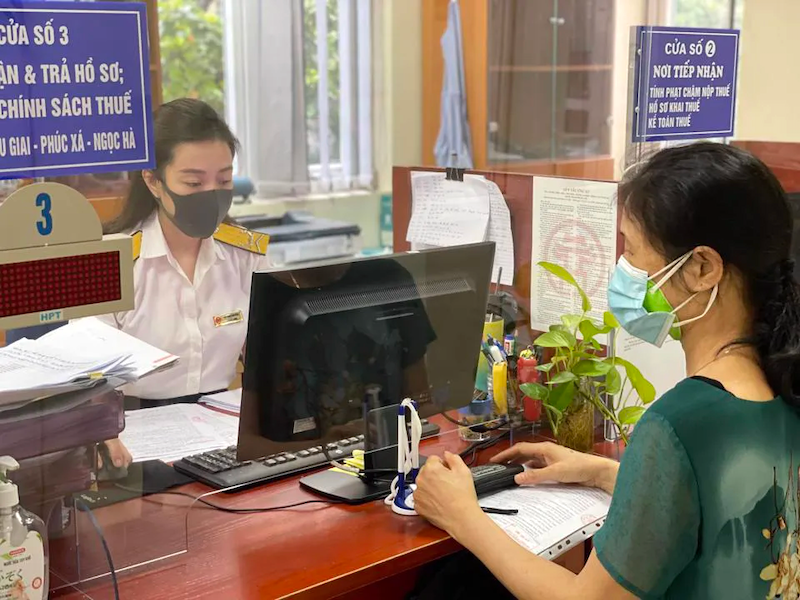Decree 70 pushes household businesses toward digital shift
Government's Decree No. 70 ushers in a digital-first tax regime from 2026, pushing household businesses toward transparency but raising concerns about costs and capacity.
Government’s Decree No. 70, issued in late March 2025, is meant to be a landmark tax reform replacing the long-standing lump-sum regime from 2026 onwards.
But for local traders and household businesses, putting this decree into effect means adopting e-invoices and digital bookkeeping, which may raise operating costs significantly.
Nguyen Van Hang, an accessory seller at Hoan Kiem Ward’s Dong Xuan Market, is an example. She used to keep records by hand.
“Now switching to cash registers, software and e-invoices is intimidating. I also worry about the cost of buying new devices,” she told the seminar “Supporting Household Businesses and Small Enterprises in the Digital Era” held on September 25 in Hanoi by Kinh te & Do thi (Economic & Urban) Newspaper.
Besides higher costs, Luu Van Hoa, who runs a hotel on Hang Be Street in Hoan Kiem Ward, worried about whether cash flow records would be accurate.
Speaking at the seminar, he said most of his customers are international travelers booking through apps like Booking, but he has no payment system or IT staff.
“Is there a safe and fast way to receive deposits directly from foreign guests in Vietnam?” Hoa asked.
Hang and Hoa’s concerns reflect those of many middle-aged household businesses still relying on traditional methods.
At Dong Xuan Market alone, more than 2,200 vendors contribute about VND67 billion (US$2.5 million) in annual taxes and now face the challenge of adapting.
Nguyen Ha Thanh, Deputy General Director of Dong Xuan Market JSC, said traditional markets like Dong Xuan have a big opportunity to modernize.
“Digital payments and e-invoices make operations more transparent and boost credibility and competitiveness against modern retail channels,” he said. “But they need strong support from technology and policies.”
According to Nguyen Hong Trang, Vice Chairwoman of the Hoan Kiem Ward People’s Committee, the ward has thousands of household businesses, many in tourism and services. They create jobs and contribute to the budget, but are under the most pressure to adapt quickly to Decree No. 70.
“We need joint support from tax and financial institutions,” she said.
Le Yen, Director of Hanoi Tax Consulting Co Ltd (Hanoitax), said old habits often make traditional sellers hesitant to learn new skills.
“Transparent declarations can help them access credit, expand business, and avoid legal risks. This is an opportunity for small traders to break free from the ‘closed loop’ of petty trading,” she said.
Multiple solutions to support small traders
To help household businesses through the transition, a range of technology and financial solutions were introduced at the seminar.

A local pays taxes in Hanoi's ward. Photo: Pham Hung/The Hanoi Times
Vu Quynh Huong, Marketing Director of 9Pay JSC, said fintech solutions must be simple, affordable, and user-friendly. The company’s gateway supports e-invoices, bank links, and small market transactions.
She added that 9Pay offers QR payments, e-wallet and international card integration and enables direct payments from foreign tourists via booking systems, while automating expense management for hotels, restaurants, and tour guides.
“This is particularly important for businesses in Hoan Kiem’s tourism sector, where thousands of small-value transactions each day directly shape the visitor experience,” she said.
Alongside fintech, BacABank and PGBank introduced preferential credit packages that prioritize approval for household businesses and SMEs maintaining transparent finances through e-invoices.
Experts highlighted this as a significant shift, as transparent declarations can now serve as the basis for accessing capital, rather than relying only on collateral.
They said this could create a “new cycle”: the more transparent the business, the easier it is to access credit, which in turn provides more resources for expansion. This dynamic is expected to encourage businesses to embrace transformation proactively rather than reluctantly.
Hoan Kiem Ward’s authorities also proposed that the government consider initial financial support packages, especially for small traders. Such assistance would reduce upfront costs of software or devices, making it easier for them to take the first steps toward digital transformation.
The involvement of regulators, banks, fintech firms, technology providers, and tax consultants has begun to shape an emerging “support ecosystem” for household businesses.
|
The seminar “Supporting Household Businesses and Small Enterprises in the Digital Era” took place against the backdrop of Vietnam’s accelerating digital transformation. The Politburo in early May 2025 issued Resolution No. 68, reaffirming the private sector as a key driver of the economy. From June 1, 2025, Decree 70 took effect, revising regulations on invoices and records while fundamentally changing the way household businesses are taxed. Speaking at the seminar, Nguyen Xuan Khanh, Deputy Editor-in-Chief of Kinh te & Do thi Newspaper, said: “To realize the spirit of Resolution No. 68, changing policies is not enough. We must also make institutional reforms, improve implementation and build a transparent, efficient business ecosystem that truly supports enterprises.” |








